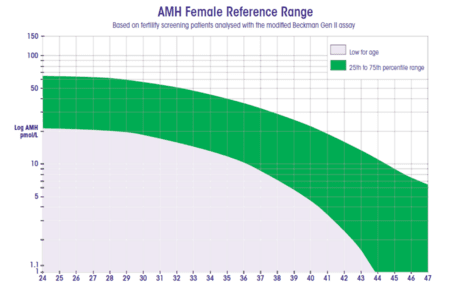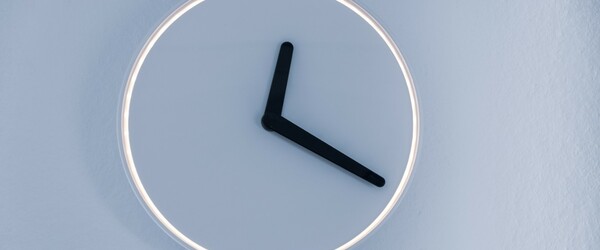Anti Mullerian Hormone (AMH) Test & Ovarian Reserve
Egg reserve test
Women are born with their lifetime supply of eggs, and these gradually decrease in both quality and quantity with age.
Anti-Mullerian Hormone (AMH) is a hormone secreted by cells in developing egg sacs (follicles). The level of AMH in a woman's blood is generally a good indicator of her ovarian reserve. AMH does not change during your menstrual cycle, so the blood sample can be taken at any time of the month - even while you are using oral contraception.
What will an AMH test tell me?

An AMH test gives us some insight into the remaining quantity of eggs and number of fertile years you may have, but it cannot tell us much about the quality of those eggs.
To interpret your results you should compare your own level with other women of the same age.
Do I need an AMH test?
The AMH test is useful if:
- you have been trying to conceive for over six months, and want to check your ovarian reserve is appropriate for your age
- you are considering IVF or other fertility treatments, as low levels of AMH could indicate a potentially poor response to IVF. Conversely, a high level may indicate an exaggerated response to the IVF medication
- you have had chemotherapy or ovarian surgery and want to know if it has affected your future fertility
- you suspect an ovarian tumour
- you would like to conceive in the future, and just want to understand your current position
How do I get an AMH test?
You will need to ask your GP for a referral to IVFAustralia for an AMH test. Then contact your nearest IVFAustralia clinic to have your blood taken. We analyse your results in our own specialised laboratory and send a copy of these results to your referring doctor.
If you are already an IVFAustralia patient your fertility specialist can organise an AMH test for you.
How much does an AMH test cost?
The AMH test costs $90 and is not covered by Medicare.
What if I have low AMH?
If you have a low AMH level, indicating poor egg reserve, your GP may consider referring you to a fertility specialist for further explanation or you can simply book an appointment with a fertility specialist to discuss your options.
It is important to remember, women who have a low ovarian reserve and women who have a high ovarian reserve fall pregnant naturally at exactly the same rate. The reason for this is that both groups ovulate one egg per month and AMH is not an indicator of egg quality.
However, AMH is a useful tool to predict response with IVF, in terms of likely egg number that will be obtained in an IVF cycle. It can also give advanced warning that ovarian reserve is declining, prompting women to explore their reproductive options sooner.
What's next?
To find out more about the AMH test or to book an appointment with a fertility specialist call 1800 111 483 or contact us below.
Find out more about the effect of age on a woman's fertility...
Contact us for to arrange an AMH test...
Can I Conceive With A Low AMH?
Request an appointment
General enquiry

How low is too low when it comes to AMH?
AMH test can give you an indication of your ovarian reserve compared to other women of a similar age. But how low is too low? Read the article below.

Is the AMH Test Reliable?
Recent media coverage has drawn considerable attention to the anti-Mullerian hormone or AMH test. The discussion was around whether this ‘egg timer test’ was worth doing or whether its time had run out.

Australian women are increasingly turning to egg freezing to protect their fertility
An increasing number of women who are not ready for a baby are exploring their options to preserve their fertility for when the time is right.